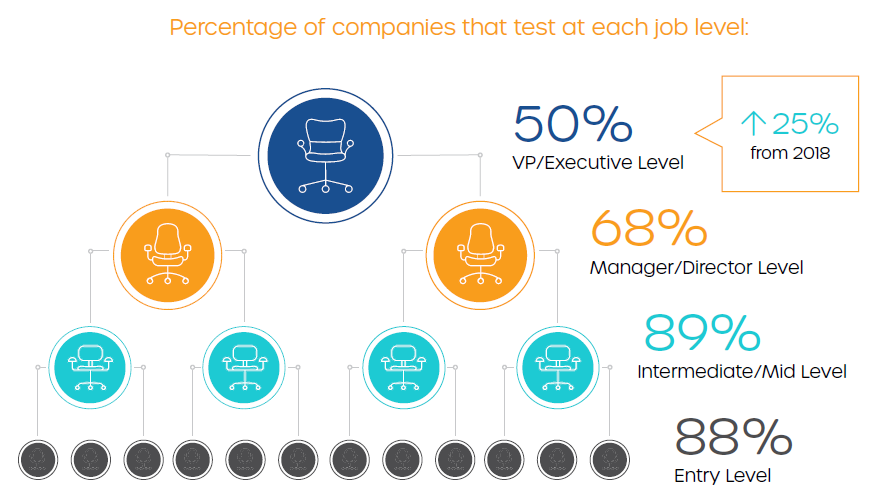Pre-employment assessments are often thought of as a way to filter through large applicant pools. While assessments can certainly help you prioritize your incoming candidates, that isn’t the full story.
Pre-employment testing provides an objective and predictive measure of how likely a candidate is to succeed on the job. Assessments are really designed to provide you with an additional layer of objective information you can use to make more informed hiring decisions. What this means is that pre-employment tests can help you make better hiring decisions regardless of how many applicants you have or at what stage in the hiring process you choose to administer those assessments.
Earlier this year, we surveyed hiring professionals across a wide range of industries to gain a better understanding of how they hire and the ways they incorporate assessments into the hiring process. We compiled the results of the survey in our second annual Pre-Employment Testing Benchmark Report. One of the things we wanted to know in the survey was who employers were administering assessments to? In other words, which job levels were they choosing to test? Here’s what we found:

From the survey, we found that the majority of our respondents use assessments to assess entry and mid-level candidates. 88% are using it for entry level candidates, while 89% are using it for intermediate or mid-level candidates. This isn’t too surprising. As we mentioned earlier, many organizations use assessments to filter through large pools of candidates, and you’re certainly more likely to get more applicants for lower level roles, for which there are fewer qualifications.
As we move up to higher job levels, however, we start to see the usage go down. Just 68% of companies are giving assessments to manager or director level candidates, and just 50% are giving them to VP or executive level candidates. Again, this pattern isn’t too surprising. When you contrast these upper level roles that require greater experience with more entry level roles, you’re likely to get fewer applicants overall. In addition, many organizations use recruiting services or referrals to source these candidates as opposed to relying solely on an open job posting.
One interesting trend did emerge from the data, however. We asked this same question in our survey last year, and we found that the number of companies administering assessments to executives has actually gone up by 25% from 2018 to 2019. We see this as a positive development. Why?
Pre-employment testing provides an objective and predictive measure of how likely a candidate is to succeed on the job. And assessments aren’t just predictive for lower level roles; they’re predictive across the board, all the way up to the executive level. Assessments can measure many of the traits that are important no matter the job level – qualities like work ethic, intelligence, problem solving skills, and critical thinking. These soft skills can also be difficult to assess based on a resume or even an interview.
Which begs the question: when hiring for upper level roles, why wouldn’t you make use of an additional piece of information about your candidates? After all, these roles are much higher stakes, and the cost of turnover at this level is much higher than the cost of turnover at the entry or intermediate level.
At Criteria, we always recommend leveraging testing as a way to make more informed hiring decisions for every job level, and we practice what we preach. Testing can help you make stronger hiring decisions that ultimately lead to a stronger team, and that’s the ultimate goal in hiring.
For more insights and statistics on the state of hiring today, download your copy of the 2019 Pre-Employment Testing Benchmark Report.




